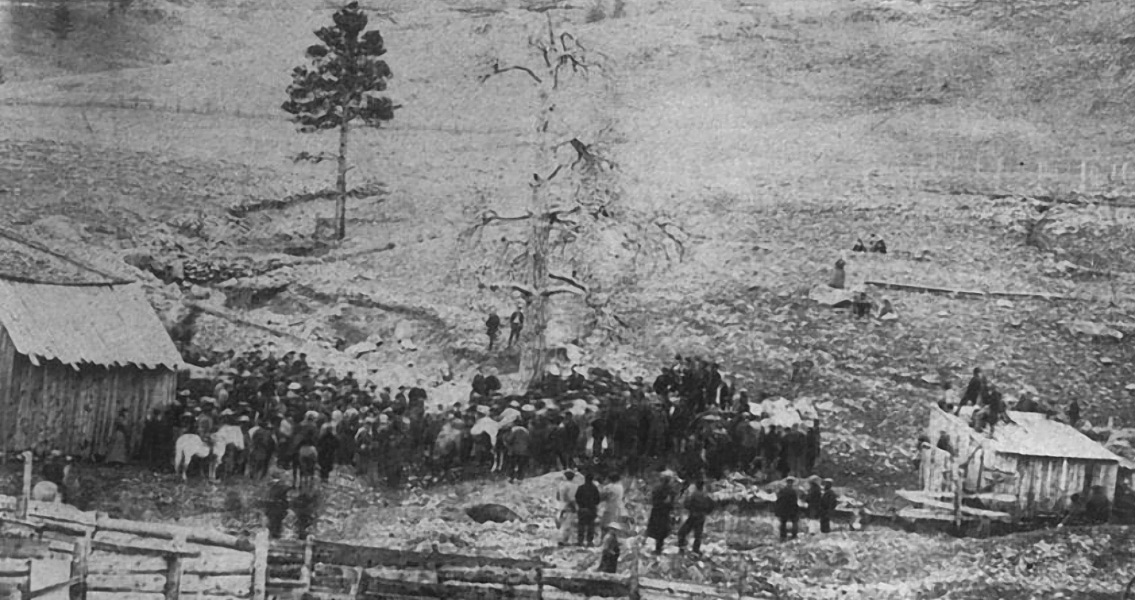<![CDATA[On the 10th March 1864, a group of vigilantes from Virginia City, Montana hanged Joseph "Jack" Slade. The incident highlighted the increasingly blurred lines between vigilantism and criminality on the American Frontier. Slade was a controversial figure in the mining town of Virginia City. Although respectable and likable when sober, he had a reputation for being perilously volatile when drunk. He had been known to fire his gun in crowded bars and make drunken threats to other members of the community. Slade's antics never injured anyone in Virginia City, but his reputation made him appear a dangerous man, one the authorities believed tarnished the image of their town. Rumours of his past may have played a part in his eventual execution. Born in Illinois, Slade had served in the US army during the Mexican War (1846 - 1848). While living in Cold Springs, Colorado in 1859, Slade was rumoured to have viciously tortured, mutilated and then killed Jules Bene, a French ranch owner who had previously assaulted him. Although it is clear that Slade did indeed kill Bene, details of the torture have not been proved, leading some to suggest that the slaying was simply the result of a conflict between two people, and far from exceptional in this period of American history. Slade was later indicted for assault in Fort Halleck, Colorado, before he finally fled to Virginia City. Slade was undoubtedly a menace to Montana and frequently demonstrated a clear disregard for authority. There is little evidence however, to suggest he had committed any crime - in West Virginia at least - worthy of the punishment he received, even by the standards of the Old West. On 10th March 1864, he was dragged from a tavern in the town and hanged. The vigilantes' actions seemed to have been motivated by a desire to create a more respectable image for the town, but they ultimately contributed to a shift in attitude among the local community regarding vigilantism. 1860s Montana was plagued by highway robberies and murders, which often led to communities living in fear, and severely disrupted local business. The problem was made worse as the influence of the Federal Government had not yet reached the area. This meant corruption was rife, to the extent that local sheriffs and deputies were often complicit in the criminality. The Montana Vigilance Committee had formed in 1863 to combat Henry Plummer, the leader of a dangerous road gang who terrorised the area. Made up of professional men from the community, such as mechanics, miners and merchants, the Committee began to systematically target and execute members of Plummer's gang. Technically, the actions of the vigilante's were illegal, but they did succeed in reducing crime in the areas where they operated. Inspired by the Montana Vigilantes, another group was organised in the state capital Helena, to combat crime there. In January and February 1864, 24 men were hanged by the vigilante's, including Plummer. However, these proved to be the peak of its impact, and vigilante justice became less common following Slade's death. As the influence of the federal government stretched further into the West and official prisons and courts laid their foundations, vigilante justice became increasingly unpopular. Slade's death highlighted a key problem with vigilantism; that a group which takes the law into its own hands can end up defining and operating by its own system of justice. Vigilantism was a feature of the lawless Old West. Slade's death proves why it could not continue within a more fixed legal system - the barriers between vigilantes and the lawlessness they were supposedly fighting often became blurred. ]]>
Vigilantes Kill Jack Slade
